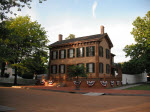Civil War 150th Anniversary: Places and Events that Shaped Our Nation 150 Years Ago
The 150th Anniversary of the Civil War is an unparalleled time to discover, discuss, and commemorate America's greatest national crisis, and explore its relevance to today’s world. More than 70 national parks across the U.S. preserve sites and stories where this epic struggle took place from 1860 to 1865.
In 2012, join friends, families, rangers, re-enactors, history buffs, scholars and your fellow Americans as we look back and examine the events that changed our country forever in the year 1862 — 150 years ago.
Lincoln Home National Historic Site
Springfield, Illinois

Abraham Lincoln believed in the idea that everyone in America should have the opportunity to improve his or her economic and social condition. Lincoln’s life was the embodiment of that idea. Many of Lincoln's social and political beliefs were formed while he lived in his home at Eighth and Jackson Streets in Springfield.
Hundreds of thousands of people visit the Lincoln Home every year to learn more about the man who fought for the ideals of freedom and democracy. Even during Lincoln's life, when he was an attorney turned president-elect, people came to Springfield to learn more about Lincoln, his family, and his home.
With a visit to Lincoln Home, follow in the footsteps of the father, husband, lawyer, and statesman who led the nation through the turbulent Civil War.
Learn more...
Ulysses S. Grant National Historic Site
St. Louis County, Missouri

Ulysses S. Grant is well known as the victorious Civil War general who saved the Union and was also the 18th President of the United States. However, few people know about his rise to fame or his personal life.
Grant first met Julia Dent, his future wife, at White Haven, her family home. Grant opposed his father-in-law’s ownership of slaves at White Haven, but recognized his legal right to do so. In March 1859, Grant acted on his beliefs; purchasing William Jones in order to “manumit, emancipate and set free said William from slavery forever.” Today, White Haven, now Ulysses S. Grant National Historic Site, commemorates their lives against the turbulent backdrop of the 19th century.
When the Civil War began in April 1861, Ulysses felt it was his duty to re-enter the military. He soon rose to fame following the battles at Forts Henry and Donelson. Grant soon acquired the nickname "Unconditional Surrender” since those were the terms he gave to the Confederate forces at Donelson. Other battles, especially Vicksburg, brought Grant to the attention of President Abraham Lincoln, who named him general of all Union armies in March 1864.
Learn more...
Stones River National Battlefield
Murfreesboro, Tennessee

The Battle of Stones River, December 31, 1862
The Battle of Stones River began on the last day of 1862 and was one of the bloodiest conflicts of the Civil War. The battle produced important military and political gains for the Union, and forever changed the people who lived and fought there.
As 1862 drew to a close, President Abraham Lincoln was desperate for a military victory. His armies were stalled, and the terrible defeat at Fredericksburg spread a pall of defeat across the country. The nation needed a victory to bolster morale and support the Emancipation Proclamation when it went into effect on January 1, 1863.
On December 26, 1862, the Union Army of the Cumberland left Nashville to meet the Confederates in Murfreesboro where they were camped, protecting the rich farms of Middle Tennessee that were feeding their men. This was the beginning of the Stones River Campaign.
Commemorative Event: 150th Anniversary Programs, December 26, 2012 to January 2, 2013
Join rangers and volunteers for a variety of walks, talks, tours and living history demonstrations that will tell the story of one of the most significant battles of the Civil War, the Battle of Stones River. The highlight will be a series of living history programs and weapons demonstrations on December 29-30, 2012, featuring 250-300 soldiers.
The Underground Railroad

The Underground Railroad refers to the efforts – sometimes spontaneous, sometimes highly organized – to assist persons held in bondage in North America to escape from slavery. Historic places along the Underground Railroad are a testament to African American capabilities. The network provided an opportunity for sympathetic white Americans to play a role in resisting slavery, and brought together, however uneasily at times, men and women of both races to begin to set aside assumptions and try to work together on issues of mutual concern.
Learn more...













